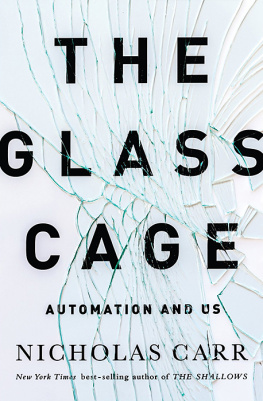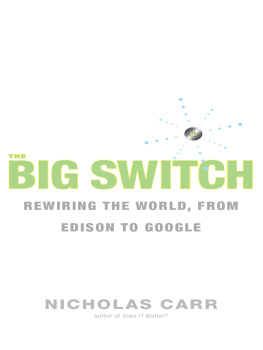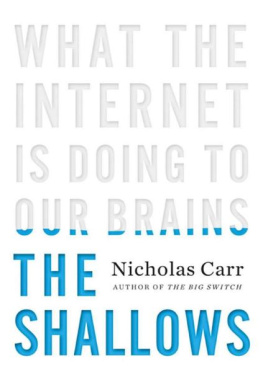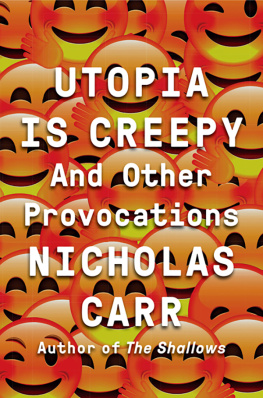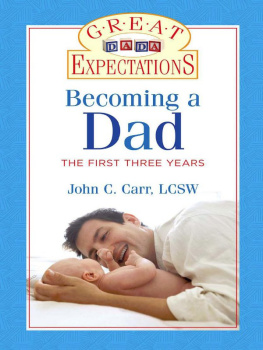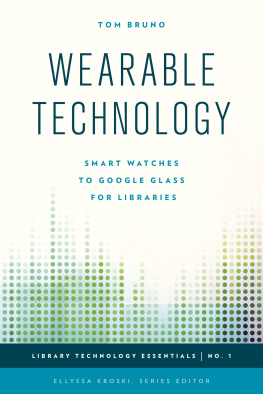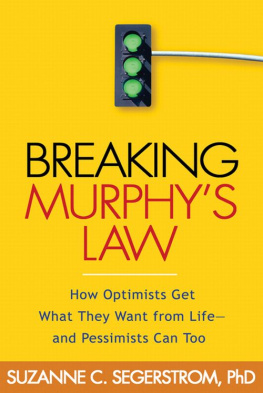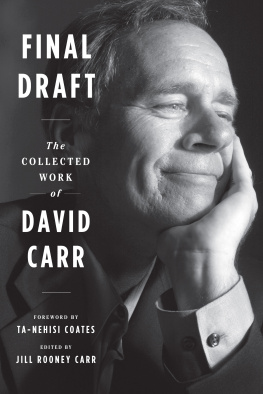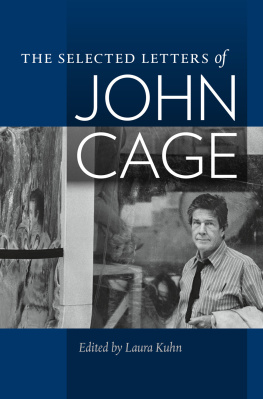
To Ann
CONTENTS
No one
to witness
and adjust, no one to drive the car
William Carlos Williams
THE GLASS CAGE
ON JANUARY 4, 2013, the first Friday of a new year, a dead day newswise, the Federal Aviation Administration released a one-page notice. It had no title. It was identified only as a safety alert for operators, or SAFO. Its wording was terse and cryptic. In addition to being posted on the FAAs website, it was sent to all U.S. airlines and other commercial air carriers. This SAFO, the document read, encourages operators to promote manual flight operations when appropriate. The FAA had collected evidence, from crash investigations, incident reports, and cockpit studies, indicating that pilots had become too dependent on autopilots and other computerized systems. Overuse of flight automation, the agency warned, could lead to degradation of the pilots ability to quickly recover the aircraft from an undesired state. It could, in blunter terms, put a plane and its passengers in jeopardy. The alert concluded with a recommendation that airlines, as a matter of operational policy, instruct pilots to spend less time flying on autopilot and more time flying by hand.
This is a book about automation, about the use of computers and software to do things we used to do ourselves. Its not about the technology or the economics of automation, nor is it about the future of robots and cyborgs and gadgetry, though all those things enter into the story. Its about automations human consequences. Pilots have been out in front of a wave that is now engulfing us. Were looking to computers to shoulder more of our work, on the job and off, and to guide us through more of our everyday routines. When we need to get something done today, more often than not we sit down in front of a monitor, or open a laptop, or pull out a smartphone, or strap a net-connected accessory to our forehead or wrist. We run apps. We consult screens. We take advice from digitally simulated voices. We defer to the wisdom of algorithms.
Computer automation makes our lives easier, our chores less burdensome. Were often able to accomplish more in less timeor to do things we simply couldnt do before. But automation also has deeper, hidden effects. As aviators have learned, not all of them are beneficial. Automation can take a toll on our work, our talents, and our lives. It can narrow our perspectives and limit our choices. It can open us to surveillance and manipulation. As computers become our constant companions, our familiar, obliging helpmates, it seems wise to take a closer look at exactly how theyre changing what we do and who we are.
AMONG THE HUMILIATIONS OF MY TEENAGE YEARS WAS ONE that might be termed psycho-mechanical: my very public struggle to master a manual transmission. I got my drivers license early in 1975, not long after I turned sixteen. The previous fall, I had taken a drivers ed course with a group of my high-school classmates. The instructors Oldsmobile, which we used for our on-the-road lessons and then for our driving tests at the dread Department of Motor Vehicles, was an automatic. You pressed the gas pedal, you turned the wheel, you hit the brakes. There were a few tricky maneuversmaking a three-point turn, backing up in a straight line, parallel parkingbut with a little practice among pylons in the school parking lot, even they became routine.
License in hand, I was ready to roll. There was just one last roadblock. The only car available to me at home was a Subaru sedan with a stick shift. My dad, not the most hands-on of parents, granted me a single lesson. He led me out to the garage one Saturday morning, plopped himself down behind the wheel, and had me climb into the passenger seat beside him. He placed my left palm over the shift knob and guided my hand through the gears: Thats first. Brief pause. Second. Brief pause. Third. Brief pause. Fourth. Brief pause. Down over herea pain shot through my wrist as it twisted into an unnatural positionis Reverse. He glanced at me to confirm I had it all down. I nodded helplessly. And thatwiggling my hand back and forththats Neutral. He gave me a few tips about the speed ranges of the four forward gears. Then he pointed to the clutch pedal he had pinned beneath his loafer. Make sure you push that in while you shift.
I proceeded to make a spectacle of myself on the roads of the small New England town where we lived. The car would buck as I tried to find the correct gear, then lurch forward as I mistimed the release of the clutch. Id stall at every red light, then stall again halfway out into the intersection. Hills were a horror. Id let the clutch out too quickly, or too slowly, and the car would roll backward until it came to rest against the bumper of the vehicle behind me. Horns were honked, curses cursed, birds flipped. What made the experience all the more excruciating was the Subarus yellow paint jobthe kind of yellow you get with a kids rain slicker or a randy male goldfinch. The car was an eye magnet, my flailing impossible to miss.
From my putative friends, I received no sympathy. They found my struggles a source of endless, uproarious amusement. Grind me a pound! one of them would yell with glee from the backseat whenever Id muff a shift and set off a metallic gnashing of gear teeth. Smooth move, another would snigger as the engine rattled to a stall. The word spazthis was well before anyone had heard of political correctnesswas frequently lobbed my way. I had a suspicion that my incompetence with the stick was something my buddies laughed about behind my back. The metaphorical implications were not lost on me. My manhood, such as it was at sixteen, felt deflated.
But I persistedwhat choice did I have?and after a week or two I began to get the hang of it. The gearbox loosened up and became more forgiving. My arms and legs stopped working at cross-purposes and started cooperating. Soon, I was shifting without thinking about it. It just happened. The car no longer stalled or bucked or lurched. I no longer had to sweat the hills or the intersections. The transmission and I had become a team. We meshed. I took a quiet pride in my accomplishment.
Still, I coveted an automatic. Although stick shifts were fairly common back then, at least in the econoboxes and junkers that kids drove, they had already taken on a behind-the-times, hand-me-down quality. They seemed fusty, a little yesterday. Who wanted to be manual when you could be automatic? It was like the difference between scrubbing dishes by hand and sticking them in a dishwasher. As it turned out, I didnt have to wait long for my wish to be granted. Two years after I got my license, I managed to total the Subaru during a late-night misadventure, and not long afterward I took stewardship of a used, cream-colored, two-door Ford Pinto. The car was a piece of crapsome now see the Pinto as marking the nadir of American manufacturing in the twentieth centurybut to me it was redeemed by its automatic transmission.
I was a new man. My left foot, freed from the demands of the clutch, became an appendage of leisure. As I tooled around town, it would sometimes tap along jauntily to the thwacks of Charlie Watts or the thuds of John Bonhamthe Pinto also had a built-in eight-track deck, another touch of modernitybut more often than not it just stretched out in its little nook under the left side of the dash and napped. My right hand became a beverage holder. I not only felt renewed and up-to-date. I felt liberated.
It didnt last. The pleasures of having less to do were real, but they faded. A new emotion set in: boredom. I didnt admit it to anyone, hardly to myself even, but I began to miss the gear stick and the clutch pedal. I missed the sense of control and involvement they had given methe ability to rev the engine as high as I wanted, the feel of the clutch releasing and the gears grabbing, the tiny thrill that came with a downshift at speed. The automatic made me feel a little less like a driver and a little more like a passenger. I came to resent it.
Next page
